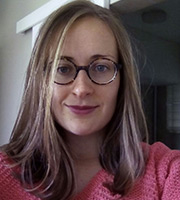Postdoctoral researcher under ATER contract (AMU PhD graduate)
Camille Martinerie has a PhD in Anglophone Studies from Aix-Marseille University and in African Studies from the University of Cape Town, South Africa. Her thesis, entitled Deconstructing ‘de/colonised knowledge’ in South Africa: the case of radical academic history under apartheid (1960-1991), focuses on the links between ideology and education, and analyzes the coloniality of history through the prism of exam questions submitted to students under apartheid. She establishes a quantitative yardstick through a discursive analysis of the evolution of the representation of the colonized and of silences in the history taught at university. In this way, she sheds light on the intertwined legacies of colonialism and apartheid, which presides over an understanding of contemporary issues of decolonization in the discipline.
Research
Decolonisation of knowledge ; South African historiography; postcolonial and decolonial studies; curriculum studies; intellectual history ; history of education
Time periods
19th century; 20th century; 21th century
Formation initiale
- Diplômée de l’Ecole Normale Supérieure de Paris-Saclay
- Agrégée d’anglais en 2016 en option B: Civilisation
- 2016-2017: Master 2 de Recherche en Histoire et Civilisation des pays Anglophones
- Sujet de mémoire: “The Fallist campaign in South Africa: breaking away from the legacy of the Rainbow Nation (march 2015-march 2017) sous la direction de Mme Mélanie Torrent (Université Paris-Diderot)
- 2015-2016: Admise à l’agrégation externe d’anglais. Master 2 Formation des Enseignants anglicistes du Supérieur (ENS Cachan)
- 2014-2015: Master 1 Anglais de Spécialité (ENS Cachan/ University of Cape Town)
- Sujet de mémoire: “The politics of performance in post-apartheid South Africa: dance and cross-cultural reconciliation”
Etudes culturelles et Civilisation britannique (Aix-Marseille Université)
- TD première année LLCER/Trilangue Etudes Culturelles: Civilisation britannique et du Commonwealth (XVIe-XXe siècle)
- TD deuxième année LLCER Etudes Culturelles “Empire, Society and Modernity” (XIXe et XXe siècle)
- TD première année LLCER Etudes Culturelles – A Disunited Kingdom? (XXe et XXIe siècle)
- TD première année LLCER Etudes Culturelles – Media Literacy (XXe-XXIe siècle)
Traduction (Aix-Marseille Université)
- TD première année Traduction (Initiation à la Version)
- TD troisième année Traduction (Version/Thème littéraire)
Français Langue Etrangère (Université du Cap)
- CM première année Grammaire Française – “Initial French”
- TD troisième année Littérature francophone
- Coordinatrice du Laboratoire de langue, première et troisième année
- Assistante de langue et coordinatrice des cours de conversation en deuxième année
- TD troisième année Français des Affaires
- Jury d’examen oraux de fin de semestre
Histoire (Université du Cap)
- TD première année “World History”, Department of Historical Studies, UCT
- Publications
- Martinerie, C. (2018).“A long dance to freedom? La nation arc-en-ciel au prisme de la danse” dans Marie-Claude BARBIER et Cécile PERROT (dir.), Afrique du Sud : Mémoire, héritages et ruptures, ouvrage GRER (Groupe de recherche sur l’eugénisme et le racisme), Paris, L’Harmattan, collection”Racisme et Eugénisme”.
- Martinerie, C. (2021). The# MustFall movements and traditions of national liberation in South Africa: Political continuities and ruptures in theory and practice. Journal of Civil Society, 1-20.
- Martinerie, C. (2023). Theorising disciplinary failures and decolonial pitfalls in South Africa: A retrospective on radical academic history under apartheid. Postcolonial Cultures Studies and Essays, (2), 1–21. https://search.informit.org/doi/10.3316/informit.46827247990726
- Conferences and interventions
- Decolonising knowledge in South African universities: a historical approach, 22 octobre 2018. Présentation orale dans le cadre du séminaire du département d’histoire, à l’Université du Cap.
- “The Decolonization of Knowledge in South Africa: the end of the post-apartheid status quo?” 7 février 2019 à Aix-Marseille Université dans le cadre de la rencontre avec les enseignants du secondaire
- “Recontextualising “colonized knowledge”: a case study of the history curricula at the University of Cape Town”. February 18th, 2019, à UNISA, Afrique du Sud.
- “Decolonization, History and Curriculum: the case of the University of Cape Town” 22 février 2019, dans le cadre de la conférence internationale “Race, Identity and Globalization in the SADC region”,à l’Université du Botswana.
- Recontextualising “colonized knowledge” in the South African University: a Discursive Shift? 12 avril 2019 dans le cadre du séminaire du LARCA “Peripheral Knowledges”, à l’Université Paris-Diderot
- “Reflecting on South African exceptionalism in the quest for the decolonization of historical knowledge”. 8 Juin 2019 dans le cadre du Congrès de la SAES sur l’Exception.
- “Deconstructing “colonized knowledge” in the South African liberal university: the limits of radical history under apartheid (1960-1991)”. 25 février 2020. Présentation orale dans le cadre du séminaire du Centre of African Studies, à l’Université du Cap.
- « History from below et la problématique du ‘rendre visible’ en situation (post)coloniale : réflexion sur les silences de l’historiographie radicale en Afrique du Sud sous l’apartheid (1960-1991). » 24 juin 2021. Présentation orale dans le cadre du colloque « Les Oublié.e.s et les invisibles de l’Histoire » organisé à l’Université Catholique d’Angers.
- “Disciplinary failures and decolonial pitfalls: a retrospective study of radical academic history under apartheid in South Africa”. 2 juin 2022. Communication dans le cadre du Congrès de la SAES 2022 sur la Faille
- “Re-founding the (post-)colonial university in a neoliberal context: a historical contextualization of the South African debate on intellectual decolonization”. 15-17 juin 2022. Communication dans le cadre du Colloque Repenser le Savoir, Refonder l’Université



